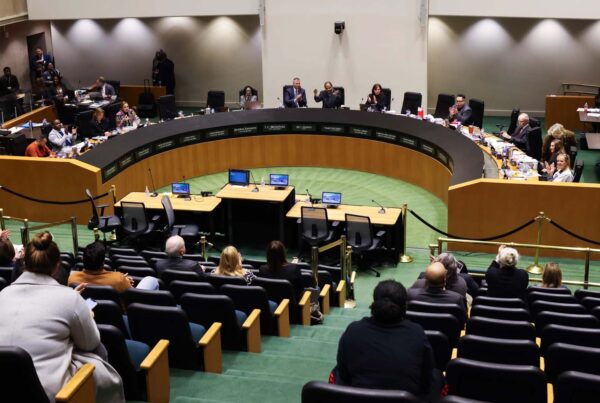White House and Senate negotiators are still trying to reach a border security deal that would unlock President Joe Biden’s request for billions of dollars worth in aid. The money would go to aid for Ukraine and Israel, as well humanitarian aid to Gaza.
But it is unclear whether a deal will be reached before senators leave town for the holiday recess.
Brandon Rottinghaus, a politics professor at the University of Houston, said that Republicans in Congress were behind connecting border policy with international aid.
“The Republicans effectively have said that they can’t support any deal on Ukraine or Israel unless there’s some kind of a deal on the border,” he said. “The Congressional Progressive Caucus is, on the other hand, saying that anything that you do to link border changes to money for Ukraine amounts to ransom.”
Rottinghaus said recent rhetoric from Donald Trump on the campaign trail around immigration has also complicated the politics behind this issue.
Over the weekend, Trump “basically used some pretty dehumanizing language about undocumented immigrants, talked about the invasion of the country and promised to lead the biggest deportation in American history,” Rottinghaus said. “So, obviously, you know, people are dug in, sides have been drawn, and bipartisanship is hard to come by.”
The Biden administration is also talking about re-imposing Trump-era policies that were unpopular among Democrats. Before this aid package went to Capitol Hill, Biden himself included border security as an element in an attempt to draw bipartisan support.
“The Biden administration is definitely underwater on some of these immigration issues. The Republicans would very much like to hang him out to dry on these. So working with them on this is a bit risky, but obviously something’s got to get done,” Rottinghaus said. “And I think the administration really wants to get somewhere in the neighborhood of $106 billion to $110 billion for Ukraine. It’s hard because obviously Republicans are souring on helping Ukraine fight Russia. That’s been even in the midst of having the Ukrainian president come to the Capitol and to talk about how they desperately need this money.”
Negotiators for the Senate and the administration have agreed on raising the standard under which immigrants can seek asylum — and they’re still talking about a possible expedited removal process. Rottinghaus said these concessions on the border are tough for a lot of Democrats to swallow.
“There’s been agreement on at least some of the framework for this. No one has seen legislation on this. No one has seen specifics. So they’re still debating this,” he said. “And honestly, I think that’s the hardest part. Border security issues, immigration issues, are just so fraught with politics that even talking about them in general ways can be complicated.
“There have been additional discussions about having migrants removed from the U.S. who are already living here without full legal status, potentially closing the U.S.-Mexico border crossings if a certain metric is hit. So they definitely are struggling to find some kind of way forward here. I think they’re going need some kind of a Christmas miracle to get it all done before they break.”
Rottinghaus said he does not see a realistic way for the Senate to vote on this package before the holidays.
“You’ve got some movement, though, in bipartisan negotiations. James Lankford from Oklahoma, Chris Murphy from Connecticut have been kind of at the forefront of this,” he said. “You’ve got all the senators who want to race home for eggnog. So they don’t want to have to wait around for there to be the prospect of negotiation. But what this all means is that we’re going to have a really packed January. They’re going to come back and literally within days will have to put together a very sophisticated and politically thorny proposal to make sure the government doesn’t shut down.”
Meanwhile, leaders in both Israel and Ukraine are feeling considerable urgency when it comes to receiving more aid dollars.
“Congress is really hard-pressed to act if they don’t have these kinds of exploding deadlines. And that’s what they hope would happen if they were trying to put this into place before the holiday break,” Rottinghaus said. “But without that, it’s going to mean some serious slowdown in terms of the fighting in the Ukraine. President [Volodymyr] Zelensky mentioned that this is going to create some complications for them to be able to hold some of the positions that they’ve had.”












